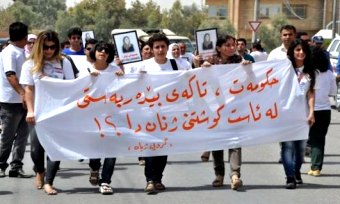Kurdish women imprisoned for infidelity
 Kurdistan Regional Government (KRG) has passed several laws to ensure the Region protects women from violence, and has set up a commission, which will create monitoring boards to measure the effectiveness of laws passed, and their enforceability in protecting women against violence. However, despite laws that prohibit violence against women, there are inherently patriarchal and discriminatory laws within the Iraqi constitution that hinder women’s liberation in Kurdistan Region.
Kurdistan Regional Government (KRG) has passed several laws to ensure the Region protects women from violence, and has set up a commission, which will create monitoring boards to measure the effectiveness of laws passed, and their enforceability in protecting women against violence. However, despite laws that prohibit violence against women, there are inherently patriarchal and discriminatory laws within the Iraqi constitution that hinder women’s liberation in Kurdistan Region.
Article 377 of the Iraqi constitution punishes the adulteress (wife) regardless of where she is situated when the act is committed, but the husband is only punished if he commits the act in the marital home. Furthermore, Article 409 specifies that a short imprisonment sentence must not exceed three years when the husband murders his wife upon finding her committing the act of adultery. Although Article 377 was amended in 2001 to include men committing infidelity outside of the marital home by Kurdistan Regional Government, it still lacks the necessary framework which can protect women.
Despite Iraq being a signatory member of “The convention on the elimination of all forms of discrimination against women” (CEDAW) since 1986, it has made reservations against several provisions that are discriminatory against women. In a short documentary published on a Kurdish News Agency (Rudaw) the current cases of 54 women are highlighted.
The Directorate of Public Prosecution Reformatory for females and Juveniles in Erbil currently holds 54 women, the oldest is 75 years old, and the youngest is 16 years old. Among these women, there are five children who currently reside in the prison. Within the institution there are several workshops available, that will enable them to learn new skills to use once they serve their sentence.
One of the prisoners, who remains anonymous says, “When I was a young girl, I was in a relationship with him for a period of four years […] I have been shunned and disowned by my family […] I have no one apart from this man”. She is imprisoned for infidelity because she resumed contact with a man she was in love with, and could not marry because her family were against it. Another woman from the prison explains, “My family disowned me […] the judge did not even ask me anything […] I cheated because my husband cheated on me first”.
One of the most common crimes among women is infidelity according to the report, and many of those who are released from prison are killed by their families who seek retribution for what they consider as dishonour and shame brought on them. The few who manage to escape the horrible fate that awaits them after serving their sentence within an unjust system; they are shunned by their families, have no residency and little work prospect.
Kurdistan Regional Government, and the bodies that have been set up to protect women against violence by members of their families or those within close proximity to them, must act to resolve the issues women prisoners face after they are released from prison. They should be offered protection, and means of supporting themselves after being released from prison instead of either ending up murdered or seeking refuge at shelter houses (that are more or less akin to a prison).
The video below is a segment of a short documentary highlighting the current situation of those imprisoned due to infidelity.
http://youtu.be/XkYns8AUqaA
Comments
What are you suggesting? Let adultery go unpunished? Principles are principles. Laws are meant to be followed I am not with any killing. Adultery is a crime in the MENA. If you commit adultery, you’ll go to prison.
It is a private matter that should be dealt with privately, and in cases of divorce, through courts that deal with divorce instead of damning the woman to a life of abandonment because of societal views on honour.
Equality before the law seems to be what is at issue here. The fact that the one law is applied one way for women and another for men is an issue, especially given the fact that Iraq is a signatory to the above mentioned treaty. And that ‘crimes of passion’ stipulation sounds like something out of West Texas. (I don’t suppose that works both ways.)
Being a Westerner, I’m inclined to think adultery is a civil and religious matter: grounds for divorce, religious sanctions, etc. (Criminalizing it is by no means tantamount to charging women with sorcery, as the Saudis do, but it is a dated practice.) But if it is to be dealt with in a criminal law system, the law should be applied equally.